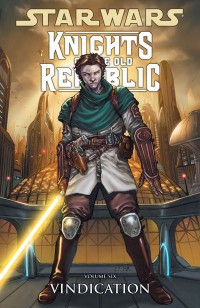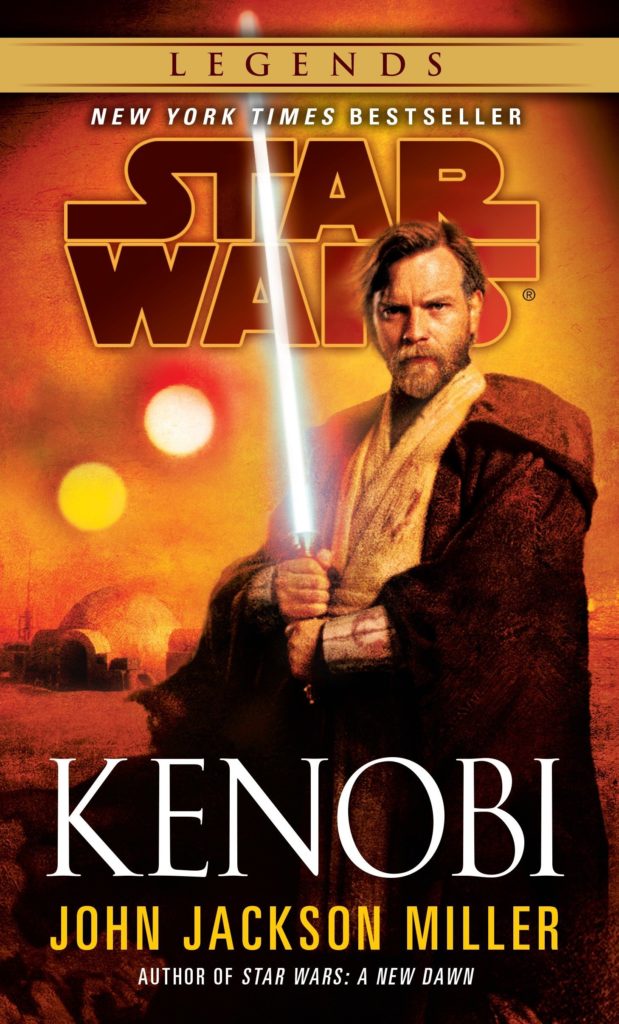John Jackson Miller is a man of words and statistics. As a scripter, he’s responsible for writing comics including Star Wars: Empire, Indiana Jones, Iron Man, Crimson Dynamo, and Bart Simpson. He’s now entering his fourth year of writing Star Wars: Knights of the Old Republic. He’s also written other games and fiction for Lucasfilm properties.
He was also previously on the editorial staff of the magazines Comics Retailer and Comics Buyer’s Guide, and the Standard Catalog of Comic Books line of books.
Okay, that covers the words. The statistics? Well, besides crafting innumerable articles that count, sum, and generally number crunch comics for Comics Retailer and CBG, he now runs The Comics Chronicles (www.comichron.com), a resource for academic research devoted to the history of comics and comics circulation tracking.
Whether you’re interested in his abc’s or his 123’s, you’ll be able to keep up with his work on his website www.farawaypress.com.
 Question 1: When did you first decide that you wanted to create your own comics for a living?
Question 1: When did you first decide that you wanted to create your own comics for a living?
About the time that I started reading them, literally! At age six, I started writing and drawing my own comics — and I kept at it, even as my education took me down a different path. But I always kept an interest in comics — and later, edited books and magazines about comics collecting and retailing. That was so fun I decided to keep on working to get to another phase in my career, writing the comics themselves.
Question 2: Who has had the biggest influence on you outside the comics industry, and how did they affect your life?
That would have to be my mother, who didn’t throw my comics away. She was a grade school librarian — she made me put my comics in order!
Question 3: Who has had the biggest influence on your comics career, and how has that person changed your work?
I think working with Maggie Thompson at Comics Buyer’s Guide — and Don Thompson, for the brief time that I knew him — was invaluable. For years, I’d read their coverage of the comics industry; once I started working within it, I couldn’t have asked for better guides to how it worked. And Maggie is an exceptional editor, who really helped me improve my prose.
 Question 4: What do you do to recharge your creative batteries?
Question 4: What do you do to recharge your creative batteries?
When your hobby is your job, it’s tough — especially when the things you take on on the side, like the research site or my webcomic with Chuck Fiala at swordandsarcasm.com are also comics-related. I’ve taken up golfing badly when the Wisconsin weather allows — it gets me away from the desk!
Question 5: Describe your typical work routine.
Increasingly, I’m doing my website work, promotions, and e-mailing done in the morning, with most of my heavy-duty writing in the afternoon. Then more promotion at night. It’s when I let the various multiple tasks leap into the time set aside for other things that the apple cart gets upset.
Question 6: What writing, drawing, or other tools do you use?
I write in Microsoft Word — and I keep a fairly-low tech system for doing my script breakdowns. Next to my desk is a dry-erase board with magnets — one for every page of a comic book — and I put index cards for the individual pages there, so I can shift them around and see what events are where, how I can make sure revealing moments are on the left so people have to turn the page, etc. There are higher-tech ways to do that, but this one works for me.
Question 7: What element of your work gives you the most personal satisfaction?
Getting the comic book in your hands is always good — but I also love discussing the process behind the story with people who really understand what you’re trying to do. That’s one of the reasons why when I started out, I committed to posting a “production notes” page for each of my projects — comics, books, games, whatever — on my site, farawaypress.com, to share a little bit of the creative process with readers.
Question 8: What has been the most rewarding project in your professional career – in or out of comics – and why?
It’s hard to choose between your babies, but I really think the Star Wars series I’m doing now, Knights of the Old Republic, has been a unique experience. I developed the series from the start and have written every issue, and Dark Horse has been great about letting us develop some themes and storylines that take a while to develop.
Question 9: We’ve all met very talented newcomers who are trying to get their first professional projects. What’s the best advice you’ve ever heard given to a promising new creator?
Write — write anything. Blogging is fine because it gets your voice out there — but writing that involves working with an editor who can help you fine-tune your writing, whether it’s a article on a local basketball game or a movie review, is a valuable experience. So much of writing is solitary, but many hands go into making comics, so it helps to be able to collaborate well, and to understand that your editors have things they need to get done. Working as an editor myself all those years, I try now to see things from all sides. Everybody’s working to get the best project possible out there.
Question 10: Time to get philosophical: What’s the most important “big idea” that you’ve learned in life – in or out of comics – and why is it important?
It’s intimidating putting yourself out there in a creative field, where your work can be judged — but you have to decide that you deserve to be there, that what you have to contribute is just as worthy of being seen as anything else out there. That doesn’t mean being overconfident, but if you don’t think you’d buy your own work, you’re not ever going to sell it to anyone else!

